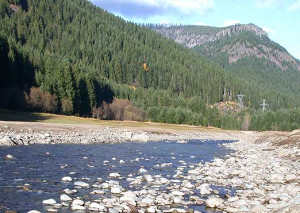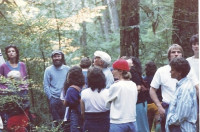


Probably most people in the KBOO radio signal area are familiar with Breitenbush Hot Springs--the gorgeous retreat/conference center with world-class hot springs located in the lush Ancient Forest of the Breitenbush River watershed, east of Salem. What many people may not know is the backstory to why most of that drainage was spared from the logging onslaught that devastated around 95 percent of the original forests of the Pacific Northwest until it was slowed down by the forest protection movement of the 1980's-90's. Today's guest Michael Donnelly was instrumental to that near-miraculous salvation, as lead plaintiff in the first-ever lawsuit to specifically protect ancient or "old-growth" forests (also known as the "cumulative effects" lawsuit), in this case at Breitenbush.
In 1986, Wednesday Talk Radio host Paul Roland first met Donnelly while involved in the campaign to protect the Breitenbush watershed. Donnelly was then Business Manager at Breitenbush Hot Springs, while Paul had been in Portland for just a year and was working at The Alliance newspaper. Always in search of a good story, he climbed 90 feet up in a Douglas Fir in early November as part of the epic North Roaring Devil Timber Sale action, which was the longest sustained direct action forest campaign up to that time. It lasted over a week, involving six tree-sitters (among the first ever in NW forest activism) and multiple arrests and brought some of the first major media attention to the issue.
You can read Donnelly's account of that remarkable campaign, which stopped most of the North Roaring Devil sale, cancelled others and ended up in strong protection for much of the watershed under the Northwest Forest Plan, here: https://www.counterpunch.org/2016/04/20/how-the-naked-hiker-saved-the-forest/. To read more about the NW Forest Plan itself, see this article originally from Z Magazine, 1994: http://social-ecology.org/wp/1994/04/the-clinton-forest-plan/
But that was then, and now numerous plans for logging in Pacific NW Native and Ancient Forests have once again reared their ugly hydra-heads, including in the Breitenbush area. The "Highway 46 Project," is a proposed "thinning" plan in Willamette National Forest's Detroit Ranger District, for a time the biggest timber-producer in the United States and epicenter of the late-80's forest protection struggle. "Thinning" to "restore" the forest or "protect" it from wildfires, is one of the main justifications being given for this new round of logging proposals, which are hitting National Forests all over the Northwest and beyond. Said Donnelly in a recent Eugene Weekly article about the plan, "My concern is money is driving it. It's tortuous for them to say they are making the forest more resilient."
Finally, a word about the photos on this page: The top photo is of the Breitenbush River facing southwest, near the hot springs. Below is a group hike in 1986 led by Donnelly (second from left in grey cap) and Ram Dass (in white cap), which took 100 people on a six-mile trek through the Old Growth forest to the South Breitenbush Gorge and back. Also in the photo (bottom right in striped shirt) is Jennifer Easton, who funded the seminal Cumulative Effects lawsuit (with Donnelly, the Oregon Natural Resources Council and Breitenbush as the plaintiffs). A real hero of Earth defense, Donnelly said that Jeffi died last year.
The bottom photo is of a bridge across the North Breitenbush River on the fabulous Gorge Trail/Emerald Forest Loop Trail. It washed out this fall in the first high water after the recent fires and the removal of so much water-holding vegetation along roads and waterways by fire crews, according to Donelly--another point of contention that will be discussed on the program (http://salemweeklynews.com/2017/10/smokey-bear-propaganda/). Re-establishment and maintenance of the historic (and some new) hiking trails near the Hot Springs has been an important part of the efforts to protect the watershed since the 1980's. Now the trails are an integral part of the Breitenbush Retreat and Conference Center's attraction for visitors from far and wide, with thousands enjoying them and gaining access to the natural wonders of the area every year. Donnelly has led an all-volunteer trail and maintenance crew for the past 30 years: removing logs and brush; putting in, maintaining, and often replacing ingenius log bridges across the Breitenbush River and Devil's Creek; shoring up eroded portions, and more.
Eugene Weekly article about the Highway 46 "thinning" project:
http://www.eugeneweekly.com/20171221/news-features/hwy-46-project-can%E2%80%99t-catch-firebreak
US Forest Service info about the proposed logging:
Other relevant articles about the fallacy of logging the forest to "protect" it:
https://www.counterpunch.org/2017/09/25/wildfires-dont-destroy-forests-logging-does/
https://www.counterpunch.org/2017/08/29/wildfire-myths-logging-the-forest-wont-save-it/
https://www.counterpunch.org/2016/04/19/the-myth-that-logging-prevents-forest-fires/
https://www.counterpunch.org/2014/05/22/the-myth-of-forest-health-logging/
https://www.counterpunch.org/2017/09/18/logging-wont-stop-wildfires/
- KBOO

